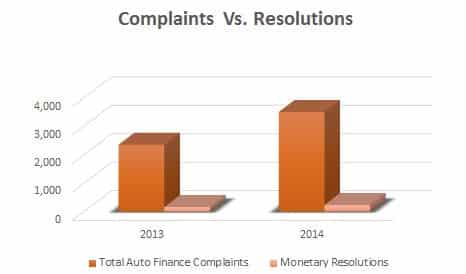CFPB Monetary Resolutions on the Rise — But That’s OK

Consumer complaints, lodged via the Consumer Financial Protection Bureau’s complaint portal, can be closed a number of different ways by lenders, most notably with the dreaded “Monetary Resolution.”
Last year, 53 auto lenders resolved 230 complaints with monetary resolutions, compared with 42 companies in 2013. However, this type of closure is not to be confused with an admittance of wrongdoing, according to Attorney John Redding, partner at Buckley Sandler LLP.
“I wouldn’t look at it as a fault issue,” Redding said, “just a way of trying to resolve complaints. And in terms of what it means, it simply means that they resolved the complaint with some kind of compensation.” And that compensation, Redding said, can take a number of different forms.
“An account credit could be another way of thinking about monetary compensation,” Redding said. “It could just be a customer service issue, where, whether the company has decided that something didn’t go as it should, or whether they decide that ‘While we don’t think it’s an issue, maybe we take care of it,’ because they treat it as customer service. And as I say, it could be in the form of a check, it could be in the form of an account credit, there are any number of ways that is could be done.”
Consumers filed 3,496 vehicle loan-or-lease-related complaints with the Consumer Financial Protection Bureau in 2014, and 7,391 such complaints since the CFPB started tracking the data in March 2012. In the face of such high complaint volume, 230 monetary resolutions in 2014 doesn’t seem too high, Redding said.
“You have to look at the volume of complaints relative to the volume of transactions,” he said. “And when you consider the number of auto finance transactions that take place in a year — and keep in mind that this is not just a place where they may complain about an origination issue, but also a servicing issue — so when you think of the number of auto finance transactions a year and then all of the servicing interactions happening on all of the previous, as well as current accounts, that number strikes me as incredibly low.”
Although it facilitates transparency and helps settle consumer complaints, with or without monetary relief, the portal is not without its faults, Redding believes.
“One of the major issues that I see with the portal is that there is no effort made, at any time, to determine whether a particular complaint is legitimate,” Redding said. “So for instance, if a consumer complains about their experience at the dealer, and it has something to do with the dealer, the finance company is still the one that is getting the complaint and then that complaint remains there, as does their response, as a statistic.”
All consumer complaints, and how the companies responded, are publicly displayed on the CFPB’s website, and all auto finance-related complaint information is also shown in real-time, on autofinancenews.net.















